Career in Homeopathy in India: Homeopathy is an alternative medical practice founded on the principle that the human body possesses the ability to heal itself. Practitioners of homeopathy address various health conditions by harnessing the body’s natural healing mechanisms. Homeopathic remedies are composed of natural substances, including plants and minerals. Consequently, homeopathic practitioners aim to identify the root cause of an illness in order to eliminate it, thereby treating the condition. It is important to note that responses to homeopathic treatments may occur more gradually.
Due to their formulation from natural ingredients. Such as plants, herbs, and minerals, homeopathic remedies are experiencing a rise in global acceptance. The Bachelor of Homeopathic Medicine as well as Surgery (BHMS) program, which spans five and a half years. Meanwhile, it is one of the most sought-after undergraduate courses in this field. Moreover, prospective students must have completed their 12th-grade science curriculum to qualify for admission into homeopathy undergraduate programs. This article will provide comprehensive insights into homeopathy courses. At last, we will discuss about the career in homeopathy in India.
Quick Facts
Before delving into detailed information regarding Career homeopathy courses in India, let us summarize the key points.
| Particulars | Description |
| Course Name | BHMS, DEHM, Organon of Medicine with Homeopathic Philosophy, Doctor of Medicine (MD) (Homeopathic- Material Medica), Repertory, Practice of Medicine, Homeopathic Pharmacy, Paediatrics, Psychiatry |
| Course Duration | UG:5.5 years PG: 2-3 years |
| Eligibility | UG: 10+2 PG: BHMS degree |
| Admission Process | NEET, AIAPGET |
| Average Course Fee | UG: 1.04 Lakhs |
| Average Starting Salary | 3.4 Lakhs pa |
What is Homeopathy?
Homeopathy represents an alternative approach within the medical domain, wherein treatment is administered through highly diluted substances. This method stimulates the patient’s innate healing capabilities. The treatment process is tailored to the unique symptoms exhibited by each patient. With the practitioner selecting the most suitable remedy.
In homeopathy, natural substances derived from animals, plants, minerals, and synthetic sources are utilized. Often referred to by their Latin nomenclature to ensure precision. Homeopathic pills are typically composed of inert substances. Such as sugars (commonly lactose), onto which a drop of a liquid homeopathic solution is applied and subsequently evaporated.
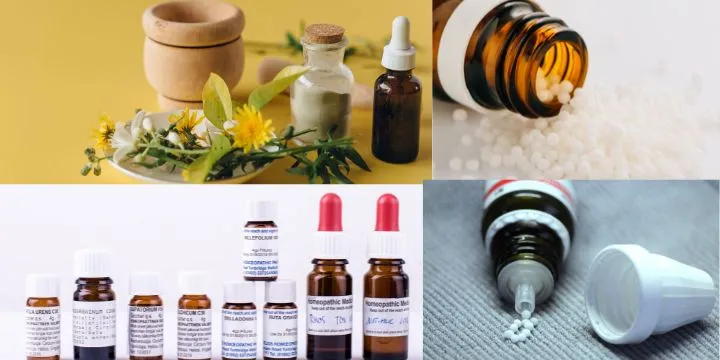
Who are Homeopathic Doctors?
A homeopathic physician is a type of medical practitioner who employs natural remedies to address various health conditions. The fundamental principle underlying this approach is that a substance capable of inducing symptoms can also be utilized to alleviate them.
During a consultation with a homeopathic physician, the practitioner will inquire about your mental, emotional, and physical well-being. Based on this comprehensive assessment, they will recommend a remedy that aligns closely with your symptoms and customize the treatment accordingly. It is their belief that lower doses can enhance the efficacy of the medicine. Many of these remedies may no longer contain any molecules of the original substance and are available in various forms. Including sugar pellets, liquid drops, creams, gels, and tablets.
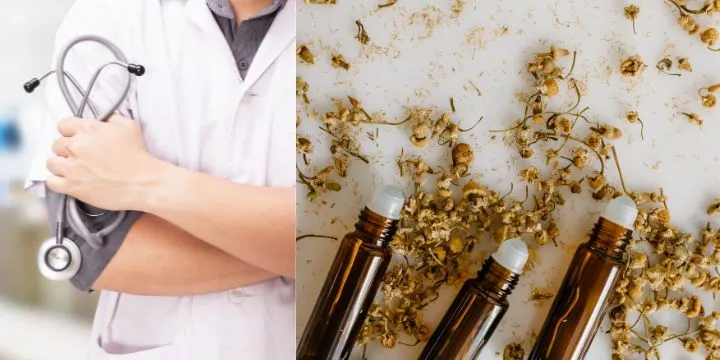
Homoeopathy Courses in India
Homoeopathy education in India is categorized into undergraduate (UG) and postgraduate (PG) programs. Below is a list of both UG and PG courses available for those aspiring to become homeopathic practitioners:
Undergraduate and Diploma Programs
| UG Courses | Duration |
| BHMS | 5.5 years |
| DEHM | 1 year |
Postgraduate Programs
| PG Courses | Duration |
| Organon of medicine with Homeopathic philosophy | 2 years |
| Doctorate of medicine (MD) (Homeopathic Materia Medica) | 2-3 years |
| Repertory | 2-3 years |
| Practice of Medicine | 5.5 years |
| Homeopathic Pharmacy | 2-3 years |
| Paediatrics | 3 years |
| Psychiatry | 3 years |
Additional Homoeopathy Courses
The following outlines the various homoeopathy programs available:
Certificate Course: Various institutions provide a range of certificate courses in homoeopathy, with durations spanning from three to six months.
Diploma Course: Students have the option to enroll in diploma or postgraduate programs in homoeopathy. Including homoeopathy and medicine, as well as electro homoeopathy medicine (DEHM). The duration of these courses’ ranges from one to two years.
Admission Process for Homoeopathy Courses
The admission process for homoeopathy courses is outlined as follows:
- Candidates seeking admission must have completed their 10+2 education with a minimum aggregate of 50% in the science stream (Physics, Chemistry, Biology). To qualify for homoeopathy programs.
- A valid NEET scorecard is mandatory for admission, and candidates are required to participate in the AACCCAIQ (15% of seats) and state-level counselling (85% of seats) organized by the AACCC or the AYUSH department of the respective state for entry into BHMS colleges across India.
- For postgraduate studies, the AIAPGET examination is necessary for admission, and counselling will be conducted through the AIAPGET PG counselling process.
Eligibility Criteria
With a few exceptions, most universities eligibility requirements are identical. Applicants must fulfil the eligibility standards to be admitted to various universities and their acceptance will be cancelled if they do not meet the eligibility standards.
The following are the primary requirements for admission to the BHMS course:
| Particulars | Description |
| Age Limits | The minimum age should be 17 years |
| Qualification | Candidates should have passed 10+2 physics, Chemistry, Biology and English |
| Qualifying Marks | They must secure 50% marks in aggregate and the candidates belonging to the reserved categories must secure 45% in aggregate |
The following are the primary requirements for admission to the MD in Homeopathy courses:
| Particulars | Description |
| Age Limit | No minimum age limit |
| Qualification | Candidates should have a BHMS degree with a minimum of 60% aggregate marks along with 1 year compulsory rotator internship |
| Qualifying Marks | Candidates should have a BHMS degree with a minimum of 60% aggregate marks |
Syllabus of BHMS and MD in Homeopathy
Homeopathy courses offered at Undergraduate and post graduate levels are designed to provide candidates with comprehensive knowledge. All the topics and treatments are provided in the curriculum. The syllabus of BHMS and MD in Homeopathy is below, respectively:
| Anatomy | Forensic Medicine and Toxicology |
| Physiology including Biochemistry | Practice of Medicine |
| Organon of Medicine, Principles of Homeopathic Philosophy and Psychology | Homeopathic Pharmacy |
| Case Taking and Repertory | Obstetrics and Gynaecology |
| Community Medicine | Homeopathic Materia Medica and Therapeutics |
| Surgery | Pathology and Microbiology |
MD in Homeopathy
| Pathology (Structural Alterations in Disease) | Training and Placements |
| The Man in disease (Holistic Concept) | History of Medicine, Scientific Methodology including research methodology and statistics |
| Clinical Investigation | The practice of homeopathy in medicine surgery and obs/gyn |
| Abnormal Psychology | Parasitology |
| Pathophysiology (Functional Alternations in Disease) | Psychiatry |
| Bacteriology and Virology | Organon of medicine with homeopathic philosophy |
Top colleges offering BHMS Courses
Here is the list of top BHMS colleges in India with their average fee structure, such as:
| S.No. | Top Colleges |
| 1 | Lokmanya Homeopathic medical college pune |
| 2 | Bharti Vidyapeeth homeopathic medical college Pune |
| 3 | NIH Kolkata- National Institute of Homeopathy |
| 4 | KUHS Thrissur- Kerala University of Health Sciences |
| 5 | NTRUHS Vijayawada- Dr NTR University of Health Sciences |
Top Colleges Offering BHMS Courses with Fees Structure (Graphical Representation)
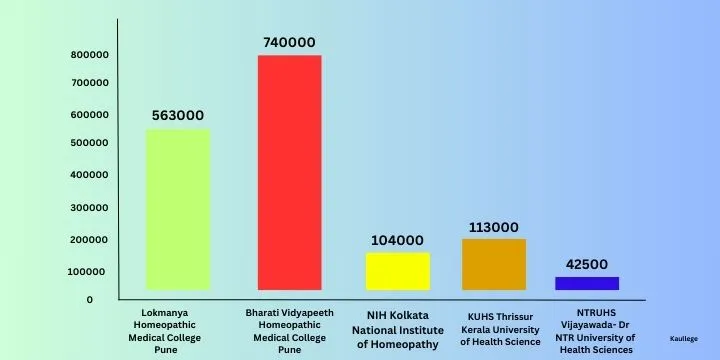
State wise Homeopathy Colleges in India
Here is the list of state wise colleges in India for students pursuing careers in homeopathy courses, such as:
| State | State |
| Andhra Pradesh | Nagaland |
| Arunachal Pradesh | Odisha |
| Assam | Punjab |
| Bihar | Rajasthan |
| Chhattisgarh | Sikkim |
| Goa | Tamil Nadu |
| Gujarat | Tripura |
| Haryana | Telangana |
| Himachal Pradesh | Uttar Pradesh |
| Jharkhand | Uttarakhand |
| Jammu and Kashmir | West Bengal |
| Karnataka | Andaman and Nicobar |
| Kerala | Chandigarh |
| Madhya Pradesh | Delhi |
| Maharashtra | Daman and Diu |
| Manipur | Dadar and Nagar Haveli |
| Meghalaya | Lakshadweep |
| Mizoram | Pondicherry |
Career in Homeopathy Opportunities in India
The field of homeopathy offers many work opportunities. Many individuals use homeopathic treatments because they are safe and have no adverse effects. Homeopathic medicines are effective for both adults and children. Allergies, colds and flu, migraines, depression, chronic fatigue syndrome. Rheumatoid arthritis, irritable bowel syndrome. Premenstrual syndrome and other conditions are frequently treated with homeopathy. Therefore, homeopathy doctors can practice in public and private hospitals once they have earned their degrees, and they may also continue their practice. The following is a list of industries in which homeopathic specialists may work: Those who are interested in teaching can work as professors at medical schools. There are enough opportunities for homeopathic research. Therefore, there candidates can continue their studies and contribute to medical journals by writing articles. They might also write chapters for homeopathy textbooks.
| S.No. | Career Opportunities |
| 1 | Government (State/Central/Local) Private hospitals and Dispensaries |
| 2 | Nursing home/Clinics/ Health departments |
| 3 | Management and administration (Government and private) |
| 4 | Homeopathic Pharmaceutical Companies |
| 5 | Clinical Trials (Pharmaceuticals) |
| 6 | National Health Mission (NHM) |
| 7 | Medical Tourism |
| 8 | Homeopathic Speciality Centers |
| 9 | Drug manufacturing units (Government, private, autonomous, cooperative sectors) |
| 10 | Drug control organizations (State and central government) |
Role of a Homeopathic Doctor
- Conducting first visits with patients to gain a complete case history, asking them detailed questions about their health, lifestyle, medical issues, nutrition and personality.
- The patient’s recovery is being monitored. Homeopathy does not allow immediate relief, instead delves into the initial reason for the issue and considers the full method of treatment that may take months.
- Organizing seminars and lectures for groups, healthcare staff and communities to promote homeopathy. It is nonmainstream type of medicine and is critical to teach practitioners and learn from them as well about newer treatment procedures.
Job Profiles
Below are the job profiles for homeopathy courses, such as:
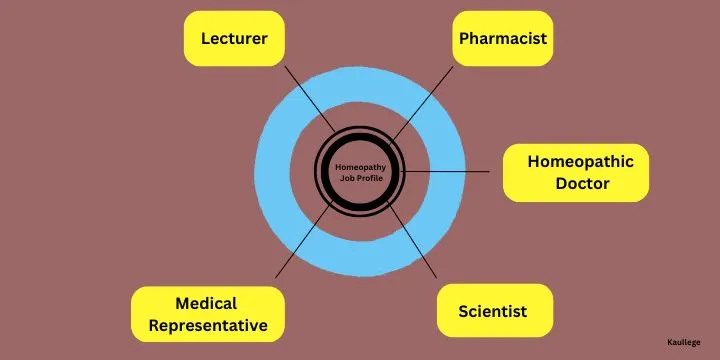
Average Salary
After completing their homeopathic education, students have two options: employment or starting their clinic. After completing a bachelor’s degree in homeopathy, they can pursue further education. Others then decide to become teachers. The following are some of the significant profiles in the realm of homeopathy:
| Job Profile | Average per annum salary |
| Homeopathic doctors | 3.4 Lakhs per year |
| Homeopathic consultant | 4.0 Lakhs per year |
| Pharmacist | 4.0 Lakhs per year |
| Homeopathy professor | 4.2 Lakhs per year |
| Research professionals | 4.2 Lakhs per year |
Job Profiles and Average Salary (Graphical Representation)
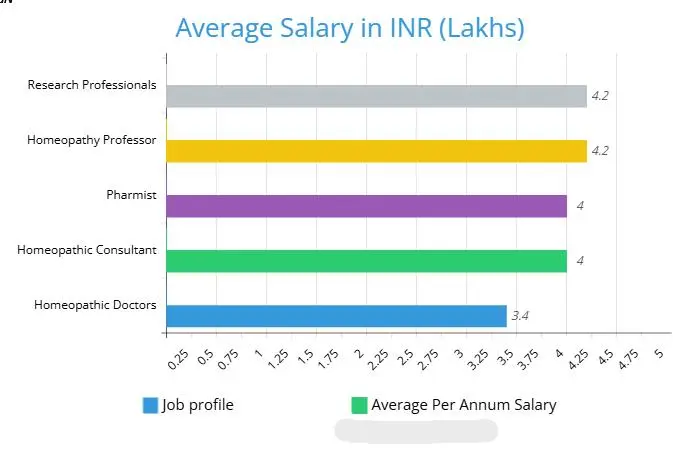
Recruiters
Top recruiting companies for homeopathy courses:

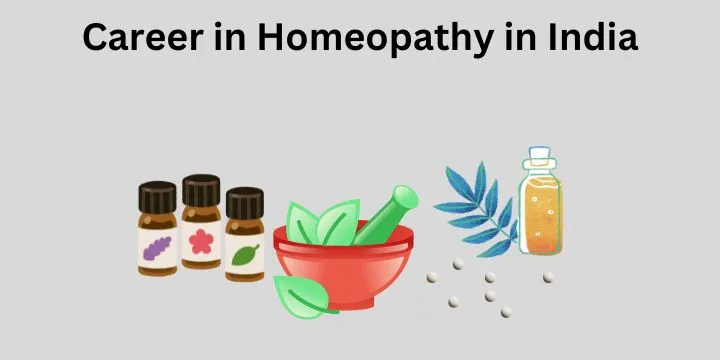




Leave a Reply